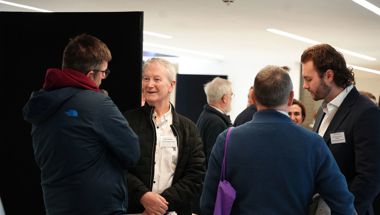
Researcher mentoring scheme
Why do we have a mentoring scheme?
We recognise that, to grow and develop within the prostate cancer research community, researchers need a way to seek and gain support from their peers.
In setting up our mentoring scheme we’ll act as facilitators, matching mentors and mentees, providing guidance and support where appropriate.

It's vital that early-career researchers are not just exposed to their supervisor's perspectives. Mentoring allows them to talk to people with different backgrounds and career paths.
What is mentoring?
Mentoring is a development partnership based on peer support — those who have achieved independence share their knowledge with those earlier in their career.

- Prostate Cancer UK will match mentors with mentees and monitor the initial progress of the mentoring relationship.
- Mentors offer career development/progression support.
- Mentees have clear development objectives and seek support achieving them.
Learn more about how researchers participating in the scheme have grown both personally and professionally through their mentorship partnerships.
As a mentor you learn from your mentee as well. You learn from the way they approach things, and you learn about how things have changed, even in the short time between when you were in their position versus now.
How do we make a match?
We ask potential mentors and mentees to fill out an online form in our mentoring handbook with basic details, including areas of expertise (for mentors) and areas for development (for mentees).
Based on this information, we will make matches. We will approach mentors and mentees individually with the potential match. Once both parties agree, we will share contact details.

What I took from this scheme was advice on career progression after my PhD, and not the nitty gritty of lab work. Speaking with my mentor gave me a great insight into the steps I could take in the future to reach their level.
How do I register to take part in the mentoring scheme?
Our mentoring handbook contains an online form to register to become a mentor or a mentee.
Frequently asked questions
Frequently asked questions about our mentoring scheme.
All UK-based researchers working in the prostate cancer field are welcome to join the mentoring scheme. Participants do not need to be working on a project funded by Prostate Cancer UK, although priority may be given to researchers we fund if demand exceeds capacity.
Mentors are likely to have recently achieved independence in their research careers, while mentees will be earlier in their career.
We will use the information you provide through the online form to match mentees who are seeking support with particular areas of career or personal development with mentors with interest and expertise in those areas. We will approach mentors and mentees individually with the potential match. Once both parties agree, we will share contact details. If either of you find that the partnership does not work, please contact us and we will support where we can.
We suggest the initial meeting is held virtually over a video call or phone call. In-person visits can be useful in some partnerships, but would need to be funded and arranged by the mentor and mentee. It is the mentee’s responsibility to make initial contact with the mentor, and the mentee would also usually arrange the subsequent meetings, at times that are mutually convenient with the mentor.
We suggest meetings are likely to last around an hour.
We suggest that meetings are initially held monthly, but this may vary depending upon the objectives and goals you have established.
The mentee should prepare for the initial meeting by identifying a clear mentoring objective that focuses on their personal development and building the skills needed for career progression.
Some examples of areas mentees could seek support with are:
- Career strategy, transitions and planning
- Establishing independence
- Managing professional relationships
- Developing collaborations
- Building effective networks
- Skill development, for example communication, critical thinking, time management
- Applying for funding
- Leadership development
- Public and patient involvement
- Diversity and inclusion
- Work-life balance.
A good mentoring relationship is built on mutual respect, trust, and shared learning. It should be a safe space where both mentor and mentee come together as equals, setting aside any power dynamics that may stem from differing levels of seniority. Rather than providing solutions, a mentor’s role is to listen and support the mentee in developing their own ideas and skills, creating opportunities for both partners to broaden their perspectives and strengthen their capabilities.
Mentoring relationships should provide a safe space within which both parties can share their stories freely with the expectation that their conversations are confidential. However, if either party has any serious concerns regarding the welfare of their mentoring partner, they should speak to the designated safeguarding lead at their institution. If appropriate, they should gain the consent of their mentoring partner before doing so.
We will send both the mentor and mentee an initial survey after four weeks to check the partnership has been set up and is running smoothly. After a further three months, we will send you both a feedback survey. We may also contact you at a later date to gather information on any longer-term impact of the mentoring scheme.
We recommend a minimum of three months. If both the mentor and mentee would like to continue the mentoring relationship beyond this initial stage, they are free to do so for as long as they find it useful.
Yes! If you are a mentee and your mentoring relationship has come to an end, you are welcome to submit a new registration form to be paired with another mentor. Mentors can continue to participate in the scheme for as long as they like. We will contact you at the end of each partnership to ask if you wish to be paired with a new mentee.
Please contact [email protected] with any questions or concerns.
If you would like any further information or have any questions regarding the mentoring scheme, please email us: [email protected]
Careers in Research Webinars
Running alongside the mentoring scheme, our careers in research webinars aim to provide an insight into some of the skills and knowledge that can help you thrive in a research career - delivered by experts in their fields.
Clinical Trials Units - Elevating Research for Real World Impact.
January 13 2026.
Professor Emma Hall and Dr Stephanie Brown, The Institute of Cancer Research - Clinical Trials and Statistics Unit (ICR-CTSU).




